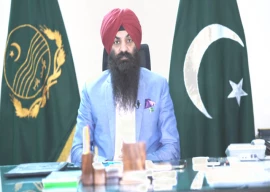
“Board members have taken decisions on certain issues which I do not support,” Sehgal, who had assumed the chairmanship of K-Electric in January 2019, said while talking to The Express Tribune on Wednesday.
“Almost all directors on the board were on one side (excluding me),” he said, adding that it had become morally unjustified for him to continue.
He, however, declined to share specific details of the decisions which widened the differences. “It would be unethical and morally incorrect to share such details,” he said.
Sehgal added that it was not justifiable to continue as the chairman in the public as well as national interest. “It is high time to quit the chairmanship of K-Electric,” he stated.
He reiterated that he would continue serving Pakistan’s interests where and when required but at the moment it was better to disassociate.
Speculations suggested that differences had developed over the timing of establishing an imported gas (re-gasified liquefied natural gas) based 900-megawatt power plant by the company.
The board was divided whether the new plant should be set up by the current management or the expected new Chinese management, which is likely to take over K-Electric when it gets all the regulatory approvals which have remained pending for about three years.
On Wednesday, K-Electric’s share price increased 1.3%, or Rs0.05, to Rs3.91 with trading in 14.7 million shares at the Pakistan Stock Exchange (PSX).
K-Electric announced Sehgal’s resignation decision in a notice sent to the PSX in the dying moments of the trading session.
“Director/chairman of the board Ikram Ul-Majeed Sehgal has resigned from the directorship of the company with effect from November 6, 2019,” the company notified.
Sehgal’s appointment as K-Electric chairman back in January 2019 was considered to accelerate the long pending sale of K-Electric’s majority stake to China’s state-owned Shanghai Electric Power by the crisis-hit Abraaj Group. His resignation is feared to again slow down the acquisition process.

1731570357-0/elon-musk-(1)1731570357-0-165x106.webp)
-(1)1717678110-0/Kendrick-(1)-(1)1717678110-0-165x106.webp)














COMMENTS (1)
Comments are moderated and generally will be posted if they are on-topic and not abusive.
For more information, please see our Comments FAQ